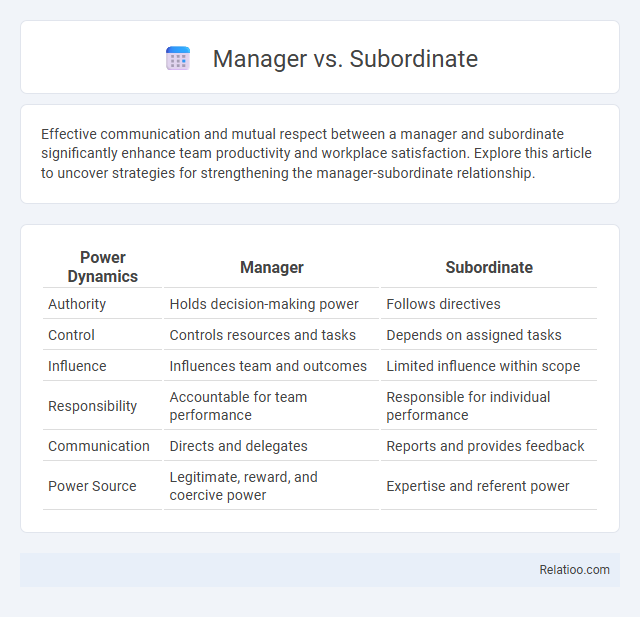Effective communication and mutual respect between a manager and subordinate significantly enhance team productivity and workplace satisfaction. Explore this article to uncover strategies for strengthening the manager-subordinate relationship.
Table of Comparison
| Power Dynamics | Manager | Subordinate |
|---|---|---|
| Authority | Holds decision-making power | Follows directives |
| Control | Controls resources and tasks | Depends on assigned tasks |
| Influence | Influences team and outcomes | Limited influence within scope |
| Responsibility | Accountable for team performance | Responsible for individual performance |
| Communication | Directs and delegates | Reports and provides feedback |
| Power Source | Legitimate, reward, and coercive power | Expertise and referent power |
Understanding the Manager-Subordinate Dynamic
Understanding the manager-subordinate dynamic requires recognizing power imbalances and communication patterns that can lead to exploitation if unchecked. Your role as a manager involves fostering trust and transparency to prevent misuse of authority and ensure ethical treatment. Clear boundaries and mutual respect are essential to maintaining a healthy, productive workplace relationship.
Key Roles and Responsibilities
Managers hold critical roles in planning, organizing, and directing teams to achieve organizational goals while ensuring efficient resource allocation and performance management. Subordinates are responsible for executing assigned tasks, providing feedback, and supporting team objectives under managerial guidance. Exploitation occurs when managers misuse authority, prioritizing self-interest over employee well-being and ethical standards, which undermines trust and productivity.
Decision-Making Authority
Decision-making authority distinctly separates managers from subordinates, with managers holding the power to set strategic direction, allocate resources, and make high-impact organizational decisions. Subordinates typically execute tasks within defined parameters, lacking autonomy in key decisions, which can create power imbalances ripe for exploitation. Exploitation occurs when managers leverage their decision-making authority to impose unfair demands or bypass employee rights, undermining workplace equity and morale.
Communication Styles and Channels
Managers typically employ direct, clear communication channels such as meetings, emails, and performance reviews to assert authority and ensure task completion, whereas subordinates often use more responsive or compliant styles aimed at receiving instructions and feedback. Exploitation in communication arises when managers manipulate these channels, leveraging formal authority to suppress subordinate input or enforce compliance beyond reasonable expectations. Effective organizational communication demands transparent, two-way channels that balance managerial guidance with subordinate engagement, preventing exploitation and fostering mutual respect.
Leadership vs. Followership
Effective leadership fosters mutual respect and collaboration between managers and subordinates, preventing exploitation in the workplace. Your role as a leader involves balancing authority with empathy to empower followership rather than enforce compliance. Strong leaders recognize the value of supporting their teams, which drives productivity and sustains ethical workplace dynamics.
Conflict Resolution Approaches
Conflict resolution approaches between managers and subordinates emphasize open communication, active listening, and mutual respect to address workplace disagreements effectively. Implementing collaborative problem-solving techniques and clearly defined roles reduces power imbalances that may lead to feelings of exploitation. Organizations benefit from training programs that empower both managers and employees to handle conflicts constructively, promoting a healthier, more productive work environment.
Skills and Competencies Required
Effective management requires strong leadership, communication, and emotional intelligence skills, while subordinates benefit from adaptability, task-specific expertise, and teamwork competencies. Recognizing and preventing exploitation demands ethical awareness, conflict resolution abilities, and clear boundary-setting for both managers and employees. Your awareness of these skill sets ensures a balanced and respectful workplace dynamic that fosters productivity and trust.
Performance Evaluation Criteria
Performance evaluation criteria for managers often emphasize leadership skills, decision-making ability, and team development effectiveness, while subordinates are typically assessed on task completion, punctuality, and collaboration. Exploitation can occur when managers use evaluations to unfairly blame or pressure subordinates without acknowledging systemic issues or resource constraints. Your organization must implement transparent, fair, and balanced performance metrics to prevent exploitation and ensure accurate assessments of both managerial and subordinate contributions.
Career Growth Opportunities
Career growth opportunities often depend on the dynamic between managers and subordinates, where effective mentorship and clear communication can enhance your skill development and job satisfaction. Exploitation occurs when managers prioritize outputs over employee well-being, limiting access to training, promotions, and fair recognition. Ensuring transparent feedback and equitable resource distribution fosters a healthier work environment that promotes career advancement for subordinates.
Building Effective Manager-Subordinate Relationships
Building effective manager-subordinate relationships hinges on trust, clear communication, and mutual respect, which foster a positive work environment and reduce exploitation risks. Managers who prioritize empathy and transparency empower subordinates to contribute authentically, enhancing team performance and job satisfaction. Addressing power imbalances through structured feedback and accountability mechanisms minimizes exploitation and promotes ethical leadership practices.

Infographic: Manager vs Subordinate
 relatioo.com
relatioo.com